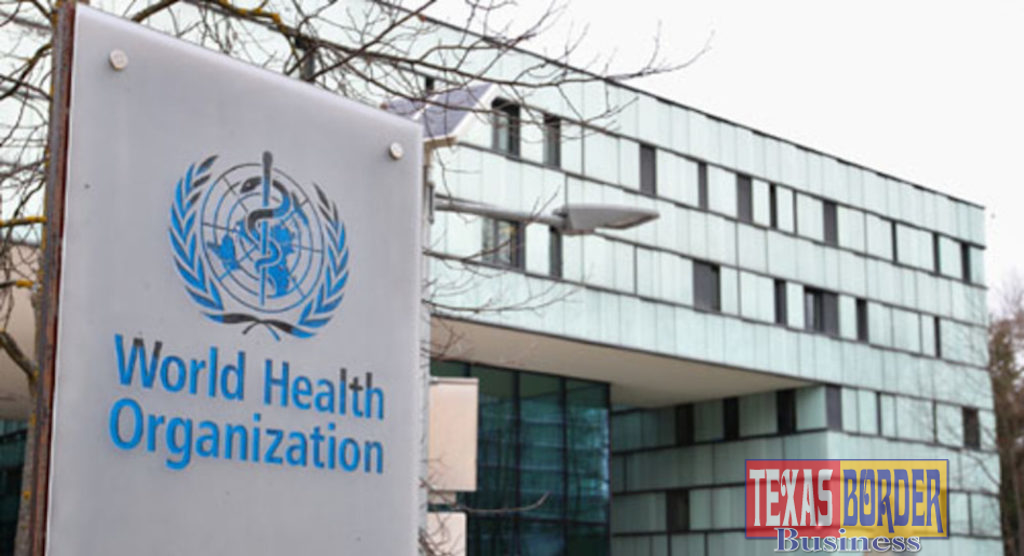
Texas Border Business
In late December, health officials in Taiwan say they warned the World Health Organization (WHO) about the infectivity of the coronavirus.
Weeks after receiving Taiwan’s warning, on Jan. 14, WHO repeated China’s claim that coronavirus was not contagious among humans.
Since 1971, China has periodically blocked Taiwan’s membership in the WHO on the grounds that the independent island nation is part of China.
The Taiwanese officials blamed the WHO’s close relationship with China for its failure to act on early warnings of human-to-human transmission of the virus, according to a Financial Times report.
Taiwan reported its concerns to a WHO framework called the International Health Regulations on Dec. 31, 2019. The IHR framework is intended to be an exchange of epidemic data between 196 countries.
“While the IHR’s internal website provides a platform for all countries to share information on the epidemic and their response, none of the information shared by our country’s [Centers for Disease Control] is being put up there,” Taiwanese Vice President Chen Chien-Jen told the Financial Times.
“The WHO could not obtain first-hand information to study and judge whether there was human-to-human transmission. This led it to announce human-to-human transmission with a delay, and an opportunity to raise the alert level both in China and the wider world was lost,” Chen said.
Taiwan has had a model response to the coronavirus crisis. Despite being situated just 140 miles off the Chinese coast, Taiwan has had less than 150 confirmed cases of the virus and two deaths, according to John Hopkins University.
WHO Director-General Dr. Tedros Adhanom Ghebreyesus has been an outspoken advocate for the Chinese government’s COVID-19 response.
Following a Jan. 28 meeting with Chinese supreme leader Xi Jinping in Beijing. Tedros praised China for “setting a new standard for outbreak control” and lauded the country’s top leadership for its “openness to sharing information” with the WHO and other countries.
“Yet in Wuhan, the epicenter of the COVID-19 outbreak, Chinese officials were busy arresting and punishing citizens for ‘spreading rumors’ about the disease, while online censors controlled the flow of information,” noted Michael Collins, a research associate for Asia Studies at the Council on Foreign Relations. “Despite growing evidence of China’s mishandling of the outbreak and rising domestic Chinese outrage over the government’s censorship, Tedros remains unmoved.”
On Feb. 20 at the Munich Security Conference, Tedros doubled down on his praise for China, stating that “China has bought the world time.”
“In contrast to his effusive praise for China, Tedros has been quick to criticize other countries for their responses to the outbreak,” Collins noted. “He called upon nations not to limit travel with China and warned against the ‘recrimination or politicization’ of the outbreak. Domestic Chinese news coverage prominently features Tedros’ praise of Xi and criticism of foreign governments.”
Critics say the WHO, in deference to China, also delayed declaring COVID-19 a public health emergency of international concern (PHEIC). On Jan. 23, the WHO’s emergency committee was split on whether to declare a PHEIC. Tedros, the final authority on the decision, chose to wait despite admitting that “this is an emergency in China.” A week later, he declared a PHEIC. By that point, confirmed cases of COVID-19 had increased tenfold with 7,781 cases across 18 countries.
John Mackenzie, a member of the WHO executive committee, publicly stated that international action would have been different if not for China’s “reprehensible” obfuscation of the extent of the outbreak.
From 2009 to 2016, China allowed Taiwan to join the WHO’s decision-making body, the World Health Assembly, as an observer under the name Chinese Taipei. After the election of Taiwanese President Tsai Ing-wen in 2016, cross-strait relations chilled and China blocked Taiwan’s future participation in the WHO.
The WHO did not address Taiwan’s claims when asked about the nation’s accusation that the WHO failed to act on its coronavirus transmission warning.
Under its “One China Principle,” the communist Chinese government officially claims Taiwan as part of its territory.
The long-running dispute between the two nations began at the end of the Chinese Civil War in 1949, when Chinese Nationalist leader Chaing Kai-Shek fled to Taiwan, opening the door for Chinese communists to wrest control of the mainland.
Credit: Free Press International
















